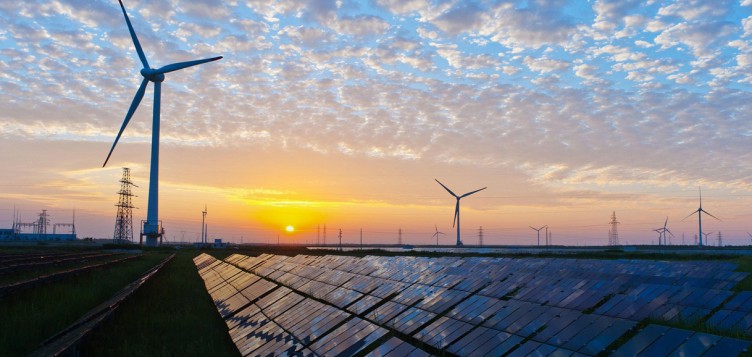


Saudi Arabia has issued a request for qualifications for its sixth round of solar and wind projects, which will add 4,500 megawatts of renewable energy to the national grid. This move is part of the National Renewable Energy Program and aligns with Saudi Arabia's Vision 2030 and the King Salman Renewable Energy Initiative. With the goal of renewable energy accounting for 50% of the electricity generation mix by 2030, this initiative aims to stimulate economic development and reduce carbon emissions. The Saudi Power Procurement Co. is overseeing the tendering and procurement process for these projects, which have already awarded over 19 gigawatts.
Saudi Arabia Paves the Way for Solar and Wind Energy Expansion
Background
Saudi Arabia, known for its vast oil and gas reserves, is embracing renewable energy to diversify its energy mix and reduce its carbon footprint. The country has set ambitious targets to increase its renewable energy capacity and become a regional leader in the field.
Sixth Round of Solar and Wind Projects
In line with its renewable energy plans, Saudi Arabia has issued a request for qualifications (RFQ) for its sixth round of solar and wind projects. This round aims to add 4,500 megawatts (MW) of renewable energy to the national grid, bringing the total installed capacity to over 19 gigawatts (GW).
The projects are part of the National Renewable Energy Program and align with Saudi Arabia's Vision 2030 and the King Salman Renewable Energy Initiative. These initiatives aim to stimulate economic development, reduce carbon emissions, and increase the use of renewable energy.
Procurement Process
The Saudi Power Procurement Co. (SPPC) is overseeing the tendering and procurement process for the sixth round of projects. Interested developers have been invited to submit their qualifications by the end of June 2023.
Top 5 FAQs
1. What is the goal of Saudi Arabia's renewable energy program?
The goal is to have renewable energy account for 50% of the electricity generation mix by 2030.
2. What are the benefits of these projects?
The projects will create jobs, stimulate economic growth, and reduce the country's dependence on fossil fuels.
3. How many megawatts of renewable energy will be added to the national grid?
This round of projects will add 4,500 MW, bringing the total installed capacity to over 19 GW.
4. Who is overseeing the procurement process?
The Saudi Power Procurement Co. (SPPC) is responsible for the tendering and procurement process.
5. What is the deadline for submitting RFQ bids?
Interested developers have until the end of June 2023 to submit their qualifications.
Conclusion
Saudi Arabia's sixth round of solar and wind projects demonstrates the country's commitment to transitioning to a more sustainable energy future. By embracing renewable energy, Saudi Arabia is taking a leadership role in the region and contributing to the global fight against climate change.

The Social Security Administration recently released updates for 2026, including a potential 2.7% increase to benefits. However, the official announcement of the cost-of-living adjustment (COLA) could be delayed due to the government shutdown. While an increased COLA is positive for beneficiaries, some argue that it still may not keep up with the rising cost of living. Additionally, beneficiaries who currently receive physical paper checks will need to make arrangements for direct deposit or a Direct Express card to continue receiving their benefits.

The Indian government has given its approval for the formation of the 8th Central Pay Commission, which will be tasked with assessing and making recommendations around pay, benefits, and working conditions for over 1.2 crore central government employees and pensioners. The Commission, which will have a chairperson, a part-time member, and a member-secretary, will have 18 months to complete its work and will also look at emolument structures and conditions in the private sector and CPSUs. The recommendations are expected to be implemented from January 1, 2026.

Prime Minister Narendra Modi launched the Gyan Bharatam Portal, dedicated to preserving and promoting India’s vast and unique manuscript heritage. Speaking at the Gyan Bharatam International Conference, PM Modi emphasized the importance of preserving India’s knowledge legacy and adapting to changing times. He also highlighted how the ancient manuscripts reflect India’s diverse cultural heritage and contribute to humanity’s progress in various fields.

The Bharat International Rice Conference (BIRC) 2025, organized in New Delhi, has gathered delegates from over 80 nations, aiming to boost India's rice export share from 40% to 60%. IREF National President Prem Garg highlighted the need for increased export to benefit Indian farmers and declared the rice industry to be self-sufficient. The event, with participation from farmers, diplomats, and exporters, also emphasizes on banning pesticides and government support with ports and logistics to further boost the industry.

Prime Minister Narendra Modi's announcement, coinciding with the 150th birth anniversary of Sardar Vallabhbhai Patel, to showcase only indigenous Indian dog breeds at the upcoming National Unity Day Parade highlights the country's reliance on self-sustained K9 forces. The Ekta Diwas Samaroh celebrated India's diversity and unity, while PM Modi emphasized the significant role of indigenous dog breeds in Indian military and cultural traditions. With the current population of 150 Indian breeds deployed in strategic areas, the initiative, which gained momentum after PM Modi's visit to the BSF National Dog Training Centre in 2018, showcases the agility, stamina, and adaptability of these breeds in diverse terrains and climates.

A young Australian expressed their difficulty in managing their finances and confessed to spending a whopping $994 on eating out in a month. Seeking advice from Reddit users, they revealed a pricey morning routine that contributed to their high expenses. Despite also spending on family meals, the important takeaway is that they acknowledged the need for budgeting and were open to learning from others' financial wisdom.

Nvidia, the Silicon Valley titan, has broken yet another market record by becoming the first company to reach a staggering $5 trillion valuation. The remarkable achievement highlights the profound impact of the company's AI chips in driving the ongoing AI revolution. However, concerns have been raised about inflated tech valuations, with the IMF warning of a possible "AI bubble." As Nvidia continues to expand globally and diversify its offerings, it remains to be seen if it can sustain its unprecedented growth.

The Federal Reserve announced a quarter point rate cut, bringing the benchmark interest rate down to a range of 3.75% to 4%. While some economists predict another cut in December, Federal Reserve Chair Jerome Powell stated that a third consecutive reduction is not guaranteed. The decision was made amid the ongoing government shutdown, causing policymakers to rely on private sector indicators for their decision. This move signals the Fed's greater concern about a cooling job market than lingering inflation. With 10 out of 12 members voting in favor of the action, the outcome of the meeting showcased deep division.

Father Muller Charitable Institutions, led by director Fr Faustine Lucas Lobo, has taken a big step towards progress and excellence by inaugurating and blessing four modern classrooms for the students of Father Muller College of Physiotherapy and Father Muller College of Allied Health Sciences. The ceremony, attended by management committee members, faculty, and staff, also saw the presence of respected individuals like Dr Michael Santhumayor and Fr George Jeevan Sequeira. These new additions are a testament to FMCI's commitment to providing top-quality education to its students.

The US Federal Reserve made the decision to reduce its key interest rates for the second time in a row, bringing it down to 3.75%-4.00%. The rate cut was approved by a 10-2 majority vote, with two dissenters who wanted a steeper cut or no cut at all. The Fed also announced that it will stop the reduction of its asset holdings from December 1, but did not provide any indication of its plans for the next meeting in December.